Opening on the landmark NCAA football game in 1970 – in which a racially integrated USC beat Alabama – Woodlawn introduces Alabama coach Paul “Bear” Bryant (Jon Voight) realizing the value of black players in football. Things then immediately – and jarringly – jump ahead three years. Set against the backdrop of Birmingham, Alabama circa 1973, Woodlawn actually centers on the struggle of high school football coach Tandy Gerelds (Nic Bishop) as he attempts to bring his newly integrated football team together and win a championship. With racial tension and violence threatening to tear the entire team – if not the school – apart, Gerelds is approached by a sports chaplain named Hank (Sean Astin) who has a radical idea: have the team give themselves over to the word of Christ. Seemingly without options, Gerelds begrudgingly allows Hank to preach his religious teachings to the team, and then watches the “miraculous” effect it has on the town at large.
Reviewing a film like Woodlawn comes with some inherent challenges because of the way it treats its subject matter. Despite its early exposition about race relations in the American south, the film’s central conflict ultimately has more to do with separation of church and state than it does with racial integration. While it certainly features some scenes that depict the racial tensions of the time – and they are by far some of the best scenes in the film – they are too few, and ultimately do not contribute to the resolution of Woodlawn’s core conflict: Coach Gereld’s struggle against a secular school board. The film opens on a promise that Christianity played a major role in breaking down racial barriers, but pushes those barriers to the periphery to instead assert that people in the American south simply embraced the teachings of Christianity – not exactly a groundbreaking revelation. In many ways, such a glossing over of significant events in American history feels disrespectful to the racial violence and turmoil of that time (tones that still resonate to this very day).
Christianity is made out to be a panacea for the problems of every single character in the film – instantly improving the lives of the people who accept Jesus. Absent fathers suddenly become Dads of the Year. Racist blowhards immediately see the error of their ways, and even Woodlawn running back Tony Nathan (Caleb Castille) instantly becomes a better, more confident player because he believes that God has a plan for him – basically religion is something akin to Michael’s secret stuff from Space Jam. Such emphasis on faith takes much of the action out of the characters’ hands and makes them passive, causing events to drive the characters forward rather than the other way around.
Woodlawn’s polarizing theme is far from the film’s only issue. The script is paced terribly, which makes the film’s two hour running time feel eternal. Seemingly important characters introduced early on either do not reappear until towards the very end to make a negligible difference on the proceedings, or simply disappear entirely without making any meaningful impact on the narrative whatsoever. So many different plot threads are introduced, such as Gereld’s relationship with his son, Tony Nathan’s high school romance, and a conflict with a rival high school, that none of the resolutions offered by the film ever feel earned.
Such pacing issues are compounded by some absurd editing techniques during moments off of the football field. If you opt to see Woodlawn, watch for a scene towards the end of the film in which Coach Gereld confronts the Board of Education. It’s a simple dialogue scene, but for some reason the Erwin brothers decided to edit it like a choppy Liam Neeson fight sequence.
These script issues generally lead to some pretty lackluster performances. Sean Astin’s Hank comes across as a decidedly one-note Christian Mr. Miyagi, possessing only a paper-thin backstory and no real motives for sticking with the Woodlawn team. Essentially every resident of Birmingham is presented as a two-dimensional character – either being redeemed by accepting Christ, or relegated to ugly stereotypes of their respective race. Very few scenes involve characters intelligently discussing their differences to come to a resolution; opinions only change after listening to someone give an impassioned sermon. As the two leads, Nic Bishop and Caleb Castille give the best performances in the characters’ private moments, but many of their conflicts with antagonistic characters repeatedly boil down to tense staring contests.
With all that said, the film does have some moments where it works. When the religious overtones are downplayed to highlight either football, or race relations, it’s easier to get on board. Woodlawn also features a pretty stellar soundtrack that makes the football games and montages enjoyable to watch. With these strengths, one can’t help but feel like Woodlawn’s budget could have been better spent ditching the weak main narrative and instead telling the story of USC vs. Alabama three years earlier.
Your Daily Blend of Entertainment News
Those who have already embraced the sort of philosophy preached in Woodlawn could likely have a great time with it. The film wastes its strong soundtrack and historically authentic aesthetic on a poorly constructed narrative that plays exclusively to a religious crowd. Distilled to its core elements, it all plays out like Friday Night Lights if Billy Graham instead of Billy Bob Thornton coached the team, and it just doesn’t work.
Originally from Connecticut, Conner grew up in San Diego and graduated from Chapman University in 2014. He now lives in Los Angeles working in and around the entertainment industry and can mostly be found binging horror movies and chugging coffee.


